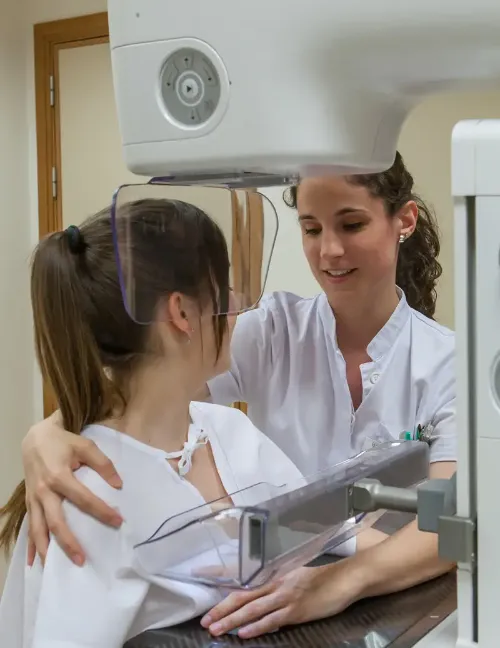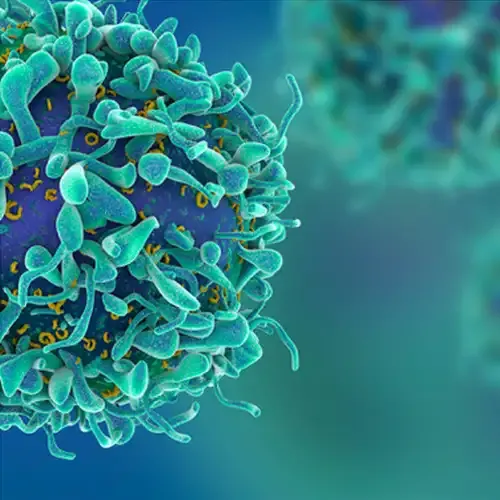Early Detection Program: Breast Cancer
When breast cancer is detected at an early stage, the chances of cure increase. Therefore, it is important to comply with screening from the recommended age and perform breast self-examination on a monthly basis.
The specialists of the Clinica Universidad de Navarra advise beginning with mammography checkups when the woman reaches the age of forty.
The Clinic has a specific medical team for the care of breast cancer, the Breast Cancer Area, where highly qualified specialists work in the diagnosis and treatment of this pathology.
Equipped with the most advanced technology, they are capable of offering the patient an accurate integral diagnosis in 24-48 hours, and the possibility of beginning, in less than a week, with their personalized treatment.

Do you want to carry out this prevention program?
Request an appointment to be assessed by our specialists
Why at the Clínica Universidad de Navarra
Speed and accuracy
Within 24-48 hours we perform all necessary diagnostic tests and inform you of the results so that you can begin treatment
Cutting edge technology
We have the most advanced technology such as mammography for dense breasts and the latest generation of magnetic resonance
Multidisciplinary team
The specialists work in coordination for the most effective diagnosis and treatment.
Experience
The Clinic is a pioneer in the Breast Cancer Early Detection Program
Learn about the Breast Cancer Early Detection Program
What does it consist of?
Between 41 and 50 years old:
- Medical consultation.
- Bilateral mammography.
- Additional breast ultrasound (according to medical criteria).
From 50 years old:
- Gynecological consultation.
- Bilateral mammography. If indicated by the specialist, puncture and microbiopsy.
Who is it aimed at?
The program is aimed at women over 40 years of age.
If there is a genetic risk in the family, it may be advisable to start screening earlier.
Our Genomic Medicine Unit will evaluate your case and, if positive, we will carry out a clinical follow-up even before the disease is diagnosed.
Prevention and early diagnosis
It is advisable for the woman to be examined because it helps to detect the changes that occur in her breasts and, if necessary, to go to her specialist.
Breast self-examination should be performed by all women once a month.
In the case of women of childbearing age should be performed preferably one week after the end of menstruation.
In postmenopausal women should also perform it once a month, on a date easy to remember so you do not forget.
The specialists of the Clinica Universidad de Navarra advise beginning mammography checkups when the woman reaches the age of forty
In the case that there are risk factors, they should be started earlier, and the specialist will be the one to select the most appropriate exploration and periodicity.
Over the last few decades, its frequency has increased, but there has also been a significant increase in the rate of cures, which is fundamentally due to the improvement of the means, both in the training of specialists and in the appearance of new techniques and the improvement of existing ones. At the same time, the awareness of women to have medical check-ups has grown.
Periodic check-ups allow for early detection, one of the main control mechanisms for possible breast alterations. As a result of prevention campaigns and periodic check-ups in women who do not present any type of symptoms, the tumors that are discovered are increasingly smaller.
Most of the alterations that a woman may encounter throughout her life are benign, frequently of hormonal origin and related to the menstrual cycle, although many others translate into the initial phase of a breast tumor. Among the tumors may appear some benign, compared to other malignant, capable of spreading to other organs.
From the age of 50, it is time to prepare to enter this new stage of life.
The woman's body undergoes diverse changes, circumstance that makes necessary a correct gynecological, psychological, nutritional evaluation, etc.
The multidisciplinary approach to the general state of health is key in this phase of life, in which early detection of gynecological diseases is important, since with the passage of time there are more risk factors for cancer.
About 8% of breast cancer cases are hereditary.
Women who are mutation carriers are up to 10 times more likely to suffer from this pathology than women in the general population.
The Genomic Medicine Unit of the Clinica Universidad de Navarra has extensive experience in performing genetic analyses to determine:
The genetic susceptibility to different types of cancer, among them breast cancer, through the study of the BRCA1 gene (in families with cases of breast and ovarian cancer) and BRCA2 (especially in families with cases of male breast cancer).
The expected response to different chemotherapy treatments, which allows designing a personalized treatment for each patient.
Diagnosis and treatment of breast cancer at the Clinica Universidad de Navarra

We have the most advanced technology for diagnosis and early detection (state-of-the-art mammography, tomosynthesis, magnetic resonance, intraoperative ultrasound).
This allows us to discover in initial stages, with much better prognosis, almost 80% of new cases.
The objective of the diagnostic tests is the early detection of the tumor and, in this way, guarantee a high cure rate. In addition, they will determine whether or not there are other affected areas.
We have the latest technology available to achieve a rapid and as accurate a diagnosis as possible:
- Mammography.
- Breast ultrasound.
- Intraoperative ultrasound scan.
- Magnetic resonance imaging.
- Breast biopsy.
- Sentinel lymph node.
- Tomosynthesis.

One of the keys to success in treating breast cancer is the comprehensive assessment by all specialists who are part of the process and the speed in establishing the best treatment guidelines.
For this purpose, the Clinic has a specific medical area for the diagnosis and treatment of breast cancer, composed of a multidisciplinary team of professionals specialized in this pathology and equipped with the most advanced technology.
Oncoplastic Surgery and Breast Reconstruction
Our surgeons specialize in surgical planning to preserve as much healthy breast tissue as possible and, if necessary, immediate breast reconstruction.
Breast Cancer Immunotherapy
We have a great deal of experience in administering the most innovative therapies, such as dendritic vaccines that complement standard treatment.
Accelerated partial irradiation with brachytherapy
Pioneers in Spain in accelerated partial irradiation with brachytherapy, reducing the administration of radiotherapy to five days, instead of the usual twenty-five days.
The best professionals at your disposal
Integrated by specialists in Gynecology and Obstetrics, Surgery and Breast Reconstruction, Medical Oncology, Radiation Oncology, Radiology, Nuclear Medicine, General and Digestive Surgery, Clinical Genetics and Oncology Nursing












